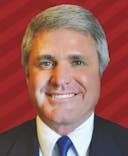Lawmakers Trade Shares Amid Surging Demand for Weight-Loss Drugs

)
The global demand for weight-loss drugs from Novo Nordisk (NVO:US) and Eli Lilly (LLY:US) is surging, prompting experts to predict that annual sales could reach $150 billion by the early 2030s, up from $100 billion estimated a year ago.
Michael Kleinrock from IQVIA Institute for Data Science noted the unprecedented public interest in these medications. Despite limited insurance coverage, many people are paying out-of-pocket or using manufacturer coupons.
Last year, global spending on obesity medications was $24 billion, with IQVIA projecting it could reach $131 billion by 2028, a 27% annual growth rate.
BMO Capital Markets projects $150 billion in annual sales by 2033, while Leerink forecasts $158 billion by 2032. Analysts highlight that these drugs can prevent costly health emergencies and treat chronic conditions, potentially encouraging insurers and employers to cover them.
David Song of Tema Obesity & Cardiometabolic ETF emphasized the significant unmet medical need, with over 100 million obese Americans and nearly a billion globally. The success of these drugs has significantly increased the market value of Lilly and Novo, with their shares rising 36% and 33% respectively this year.
Competitors are developing treatments offering more convenience, better weight loss, or additional health benefits and over 80 experimental obesity drugs are in human testing.
David Song expects price competition as new players enter the market, but anticipates that wider access and higher volumes will balance any price decreases.
Taking into account, the politicians' trust in these firms, multiple lawmakers were seen selling shares of LLY in recent months, including Sen. Tommy Tuberville and Rep. Ro Khanna. In contrast, numerous lawmakers were witnessed stocking up on NVO this year including Rep. Michael McCaul.





